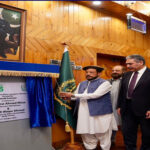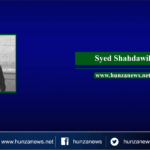ISLAMABAD: One law. That is all what the Parliament of Pakistan had to offer when the 14th National Assembly completed its first parliamentary year, during which Prime Minister Nawaz Sharif made a mere seven appearances – two per cent of the total time the lower house remained in session.
HunzaNews May 23rd, 2014.
On the other hand, it has been over a decade and a half that the prime minister has not entered the hall of the Senate. The premier could have availed this opportunity but he, according to some political observers, does not want to be at a place where his own party is in a minority.
The next possible appearance of PM Nawaz in the Senate, despite all the exhortations and demands from the upper house, could be after the 2015 Senate elections in which his Pakistan Muslim League-Nawaz would emerge as a majority party.
Another reason for the delay in legislation seems to be absenteeism – the cause of several protests and unceremonious ends of proceedings. There has not been a single day during the entire parliamentary year when all 342 members were present.
Taking the cake were Eng Usman Khan Tarakai of the Awami Jamhore Ittihad Pakistan and the National Party’s Sardar Kamal Khan Bangulzai who attended the proceedings for only two days in the whole parliamentary year.
According to FAFEN, 298 members were present in the house only once, that too, during the third sitting.
It is perhaps due to this very reason that the government has not bothered to persuade or even tried to convince the opposition to support the passage of the remaining 10 bills passed by the National Assembly that are awaiting the Senate’s approval.
Moreover, the opposition staged walkouts due to absence of government members around three times during the year. Interior Minister Chaudhry Nisar Ali Khan had also triggered the opposition to boycott the proceedings three times for what they said were “unparliamentarily remarks.”
“The National Assembly failed to emerge as the forum of substantive debate and effective oversight of the executive,” PILDAT president Ahmed Bilal Mehboob said while talking to The Express Tribune. Commenting on the first parliamentary year, he said, “None of the legislation passed by the National Assembly could become law and are pending in the Senate.”
He said that the prime minister’s rare presence in the house conveyed a negative message about the importance and effectiveness of the house. “While a serious civil-military strain is developing, the lower house or its committees did not weigh in to stem the tide of an emerging crisis of confidence.”
Express Tribune























